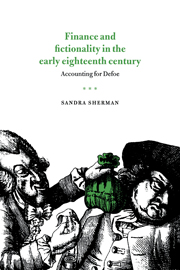4 - Fictions of stability
Published online by Cambridge University Press: 12 January 2010
Summary
REALITY AS ARTIFICE
Defoe's exculpatory strategy in The Compleat English Tradesman hinges on the apparent chronic disjunction in marketplace texts between volition and performance: no text could be presumed to manifest personal agency, and thereby to constitute a willed representation of the self. Yet if The Compleat English Tradesman posits the radical uncertainty of representation, it must still account for, and ideally destabilize, discursive formations that purport to render credit free of ambiguity. Such formations threaten the epistemological posture of the market exploited by Defoe, i.e. that texts which represent the market are generically uncertain and their authorship dispersed. Only if nontransparency is attributable to all texts involved with credit, will readers forego attempts to determine genre and locate accountable authors. The existence of texts claiming both certainty and an involvement with credit is therefore an urgent preoccupation of The Compleat English Tradesman.
Texts that claim absolute transparency subsist as highly wrought artifacts, the perfect expression of volition in performance, where the “intent” is complete self-revelation. The author renders himself with candor and signs his name. This certified clarity, emphatically distilled from the surrounding phenomenal flux, renders such texts fictive – their abstract stability misrepresents the real. The crucial factor is that such texts never acknowledge their abstraction, and do not conceive of themselves as fiction. Purporting to be univalent, certain, and absolutely true, such texts are Fictions of Stability.
However, if one imagines Truth as an abstraction of reality, then fictions of stability are “true.” In contradistinction to the credit/fiction homology, Truth (so represented) is isolable and quantifiable, detachable from potential fiction.
- Type
- Chapter
- Information
- Finance and Fictionality in the Early Eighteenth CenturyAccounting for Defoe, pp. 129 - 155Publisher: Cambridge University PressPrint publication year: 1996



